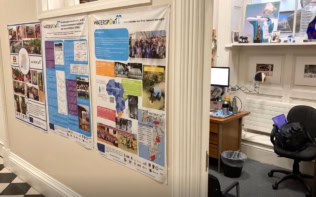Educating today's physics students is essential for the health and vitality of the subject. But João Magueijo says that compulsory training courses designed to help new university lecturers in the UK are pointless and a waste of money

Richard Feynman, in one of his famous rants, evoked as a metaphor what he called “cargo-cult science”. During the Second World War, the indigenous people of the South Pacific became accustomed to US Air Force planes landing on their islands, invariably bringing a profusion of desirable goods and tasty foods. When the war ended, they were distressed by the discontinuation of this popular service. So, they decided to take action. They cleared elongated patches of land to make them look like runways. They lit wood fires where they had seen electric floodlights guiding in the planes. They built a wooden shack and made a man sit inside with two halves of a coconut on each ear and bamboo bars sticking out like antennas: he was the ”air controller”. And they waited for the planes to return.
Even though Feynman meant his figure of speech to apply to fake science, it fits a number of the current UK government’s education policies like a glove, such as its obsession with being seen to be training people – as opposed to actually helping staff develop. Such policies are all for the benefit of politicians and bureaucrats: pure gimmicks that would be funny were they not alienating staff and actually lowering the standards they are supposed to improve. Just ask any high-school teacher wading through reams of useless paperwork. Higher education has not escaped the blitz either.
New lecturers at universities have long been short-changed when they are forced to take qualification courses to supposedly enable them to teach and supervise students. Over the past five years, these “qualifications” have expanded into certificates obtained over two years on a part-time basis. More than 80 hours of contact time and the submission of a dissertation are now the minimum requirement. Failing the course often means remaining under probation, or being blocked from promotion. (There are even plans to convert the certificates into postgraduate courses.)
These courses are sanctioned by the Higher Education Academy (HEA), which was founded in 2004 “for students in UK higher education to enjoy the highest quality learning experience in the world”. Most universities have complied with its requirements, setting up a central training facility dishing out the same course for everyone. And as these courses have become more burdensome, they have, I regret to report, also become more useless. I have collected numerous comments by e-mail, in person and from Web forums from people taking such courses in a wide range of universities and subjects (see “From the horse’s mouth”, below). Almost all were negative, with the all-time winner being from a colleague of mine who was asked to cut out cardboard “buzzwords” to form phrases on the theory of education. “It was the lowest point in my whole academic career,” he told me. “I felt that I was being treated like a moron.” What is going on here?
A little bit of history
Education is a controversial business that has for long excited passionate debate. At universities the task is often performed by academics who are much more interested in research and therefore regard teaching as a chore. It is also done in the least onerous format for the staff, namely in the form of traditional lecture courses that compress the material as much as possible. Paradise for most scientists is to work at a place like the Institute for Advanced Study in Princeton or the Perimeter Institute for Theoretical Physics in Waterloo, Canada, where teaching duties are almost completely absent. Feynman stood aside in this respect, stressing in his writings the mental block that a research-only framework tends to induce. But the fact is that only a few of us enjoy teaching, and even then we are mostly not as good at it as Feynman blatantly was.
So it is not as if there is no scope for improving university teaching, both at a personal level and as a system. Regarding the latter, “to lecture or not to lecture” is a poignant issue. Even the verb “lecturing” sounds negative, and has patronizing overtones. Other avenues should be explored, such as project work, discussion classes and “problem-based learning”, where students work in small groups tackling open-ended problems helped by lecturing staff. Alas, none of these noble considerations permeate what is actually being done to improve higher education in response to government initiatives, such as the training courses being promoted by the HEA.
The task, instead, has fallen prey to educationalists, or education theorists: people who specialize in the theory of how teaching and learning works. Do not get me wrong, at their best, these people are outstanding. They are experienced teachers, often with a maverick streak, who faced difficult teaching environments and found out the hard way a method that worked. They then collected their experiences into “systems”. Maria Montessori’s work with “defective” and poor children is a bright example of a pedagogy that works.
But the real problems arise from the disciples that follow. Many run-of-the-mill educationalists have no classroom experience and merely parrot what the master said, typically out of context. They hide behind vacuous jargon and force-feed their charges fashionable theories, regardless of the suitability of these ideas. Educationalists like to say that each student is different; yet despite the fact that their theories were developed typically in the context of the humanities, they want them to be valid for physicists, medics, everyone. The one-size-fits-all nature of these courses is regarded as their worst drawback.
Still, there are worse irritations to those who take these courses. They are told to avoid technicalities – to the point where mathematicians are advised not to write formulas on the blackboard. Yet educationalists are the worst offenders when it comes to verbosity and an inability to state concisely what they mean. Worse, they counterpoint lecturing with ridiculous “teaching games”. Surely I do not need to cut out cardboard buzzwords before my brain is graced with a thought.
Something has gone horribly wrong in the business of real, practical educationalism. Certainly, educationalism could be good, but in reality it is a case of “do as I say, not as I do”.
To be positive and constructive
It is difficult not to sound exasperated when discussing this matter, but the fact is that no-one is listening to the complaints. Educationalists emphasize the importance of student feedback, yet they close their ears and entrench themselves when their own students complain vociferously about the inadequacy of their courses. To copy, verbatim, one of the comments I have collected: “If academics treated their students like educationalists treat their student academics, they’d be appalling teachers.”
But the educationalists are right about one thing: there is nothing more embarrassing than giving a bad lecture – something virtually every lecturer has experienced. And with most UK universities now charging students to attend, there is, quite rightly, a growing emphasis on ensuring that lecturers actually know how to teach. So what could be done to make these courses more useful?
A variety of techniques have been tried in other countries, in the context of lecturing or seeking alternatives to it. But the fact is that students – particularly those in the UK – prefer lectures to more interactive methods (such as group discussions), no matter how much they complain about boring lecturers. This is certainly the case in physics and maths. So let’s do as we preach and first look at our students rather than try to impose our theories upon them. In practice, the issue of how to improve teaching may have to boil down to that of improving lecturing techniques. And a lot can be done in this respect.
For example, the Nobel-prize-winning physicist Julian Schwinger is famous for taking acting lessons to help him face a crowd of undergraduates at Harvard University. And in due course he became an outstanding teacher (to the point of being nicknamed “the snake-oil salesman”.) It makes sense: good lecturing is a bit like acting. A lot depends on body posture, voice placement and general performance techniques (areas in which all of us could improve, I am sure). Bring in an actor and it could do wonders.
More prosaically, we could simply watch colleagues in our field who are particularly good lecturers and learn from them. Or conversely, be observed regularly by an experienced lecturer known to be popular with undergraduates and told in concrete terms what worked and what did not in our lectures. As one colleague suggested, “A simple course allowing us to learn from a video of our own lectures would be immensely useful.” Undergraduates themselves can be a copious source of very vocal feedback, often constructive in spite of the language in which it is cast. Sadly, this takes place only rarely, if at all, on current lecturing courses.
And yes, some theory of education might be useful, too. Knowing some background about how people learn can only help. But the onus is on educationalists to prove that this is indeed relevant on a case-by-case basis. How can they gauge whether they are really hitting the target? Make the courses non-compulsory. The attendance record will show whether this does indeed improve teaching or not.
The psychology of fear and loathing
When I raised this issue in an article in the Times Higher Education last summer (20 August), I was surprised by the number and venom of those who came to my support, by e-mail and in the Internet discussions that followed. But one glaring feature shocked me: the vast majority of these comments were anonymous and several correspondents confessed to being “too oppressed” to complain openly. You cannot blame them. When one of my colleagues prepared a portfolio explaining how his teaching could be improved and why the teaching course had not filled that role, he was declared “not yet commended” and kept on probation (in fairness, a similar stunt at Nottingham University got full marks). This speaks volumes for the atmosphere of intimidation towards younger staff surrounding these initiatives.
Another problem is that the feedback techniques employed to monitor the usefulness of these courses certainly feel, at least to me, as if they are rigged. I vividly recall that when I had to take these courses, virtually every one of my fellow attendees complained about it in unprintable terms. Yet the course website paraded a profusion of positive comments from seemingly satisfied customers.
The fact is that if only all trainee lecturers decided collectively to boycott the initiative, it would not last another day. But that is unlikely to happen and any attempt to improve things will have to come from answering the question of how this situation came about. I have gathered a number of possible theories.
One potential explanation is that universities do not have a choice. These courses are government imposed and universities simply have to comply. With so many useless gimmicks thrown at hospitals, schools and universities by the government, this is an answer that pacifies some critics, as if bad government initiatives are an unavoidable evil, like swine flu. But reality does not corroborate this theory. Indeed, the interpretation of what is legally mandatory is loose and some universities, notably Oxford and Cambridge, have made a point of not following the government directives. The minutes of a Cambridge meeting where this sensible decision was taken concluded that “current staff development provision was felt to be good and appropriate. There was little enthusiasm for expanding staff development provision and none for a compulsory teaching qualification.”
An alternative explanation – that this is all a matter of money – can also be ruled out. Universities receive tens of thousands of pounds a year from the government to run these courses, but this is actually not much in the broader scheme of things. Indirectly, however, this possibility remains open. Who knows what blackmail universities are subjected to behind the scenes.
Perhaps the most likely explanation for the current situation is that a rogue group of edu_cationalists and bureaucrats has emerged inside universities and the government. Rogue groups are not about doing a task. They are about self-perpetuation, surviving in a ruthless way by killing off all opposition, reproducing and expanding. This seems to be the opinion of the majority of my colleagues. As Alexander Schekochihin, a former Imperial physicist who is now at Oxford, put it, “[These courses are] a classic exercise in self-perpetuation by a parasitic structure on the college’s body – self-perpetuation achieved by wasting large amounts of other people’s time.”
Cardboard monuments
We are obviously facing a case of “cargo-cult” training, to use Feynman’s metaphor. These courses are more about ticking boxes and satisfying bureaucrats than about teaching skills. This is particularly noxious since we live in a time of thrift, when we are being asked to save and cut costs as much as possible. Cuts are being imposed in training that actually works – for example the popular foreign-language courses at Imperial. Here is a demonstrably useful training initiative: learning a new language. The courses are non-compulsory and are not free, yet people flock to them. They work! Sadly they are being cut, while money continues to be wasted on training initiatives that no-one likes and that have zero track record of demonstrable usefulness, just because they please the bureaucrats.
Regrettably “cargo-cult” training is not only an “anti-saving” at a time of financial austerity, it is also “anti-training”. It can be argued that it actually lowers standards. It certainly alienates valuable staff: I know of top candidates steering clear of certain institutions in order to avoid these courses. This suggests that if educationalists were paid their full salary but required to stay at home and do nothing, then it would already be a major improvement.
From the horse’s mouth
“I have learned nothing of any use and been reduced to tears of rage.”
“[I have felt] utterly patronized and frustrated by the waste of time.”
“A colossal waste of time and resources, and an insult to the lecturer’s intelligence.”
” I’ve learnt more about how not to teach from the education lecturers than how to teach.”
“[Full of] daft warm-up sessions and ‘games’.”
“Laden with ideologies and ideas that were trendy about a decade ago.”




